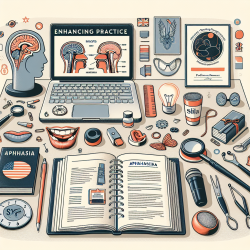As a Special Education Director, part of my role is to ensure that our educators and therapists are equipped with the most current and effective strategies to support our students' diverse needs. The challenges associated with communicative disorders, particularly those related to cleft lip and palate, require specialized knowledge and skills. Drawing from the insights of the second edition of "Communicative Disorders Related to Cleft Lip and Palate," edited by Kenneth Bzoch, this blog aims to highlight key findings and suggest ways to implement these in practice or encourage further research among practitioners.
Understanding the Complexity
The book underscores the complex nature of communicative disorders associated with cleft lip and palate, emphasizing the importance of a multidisciplinary approach. The involvement of a craniofacial team, including speech pathologists, is crucial in addressing the multifaceted needs of these individuals. This holistic perspective is vital for special education professionals to adopt, ensuring comprehensive support for students.
Diagnostic Insights
Diagnostic aspects of communicative disorders are thoroughly explored, offering detailed evaluations of functional and organic classifications. For practitioners, staying abreast of these diagnostic tools and evaluations can enhance the accuracy of identifying specific needs, leading to more tailored and effective intervention plans. Encouraging a deeper dive into these diagnostic strategies can significantly impact the success of therapy outcomes.
Therapeutic Strategies
The text presents a variety of therapeutic strategies, highlighting the importance of early intervention and the potential benefits of intensive training programs. For educators and therapists, exploring these methods can open new avenues for supporting students with cleft lip and palate. Sharing these insights in professional development sessions or incorporating them into therapy plans can foster a more dynamic and effective therapeutic environment.
Research and Development
While the book acknowledges the scarcity of research in certain areas, it also presents a compelling case for the need for ongoing investigation. As educators, it's imperative to not only apply current knowledge but also to contribute to the expanding body of research. Encouraging practitioners to engage in research activities can lead to innovative approaches and techniques that further enhance the support provided to students with cleft lip and palate.
Practical Application
Implementing the outcomes of this research involves a commitment to professional development and a willingness to explore new strategies. Educators and therapists can start by:
- Participating in workshops and training sessions focused on the latest diagnostic and therapeutic approaches.
- Collaborating with a multidisciplinary team to ensure a comprehensive support system for students.
- Engaging in research projects to explore innovative therapy techniques and contribute to the field.
- Adopting a flexible approach to therapy, tailored to the unique needs of each student.
By embracing the insights and strategies presented in "Communicative Disorders Related to Cleft Lip and Palate," educators and therapists can significantly enhance the support and intervention provided to students facing these challenges. Let's commit to continuous learning and collaboration to make a meaningful difference in the lives of our students.
To read the original research paper, please follow this link: Communicative Disorders Related to Cleft Lip and Palate 2nd ed.










